elasticsearch 拼音分词器 自动补全。

elasticsearch 拼音分词器 & 自动补全。
文章目录
-
- elasticsearch 拼音分词器 & 自动补全。
-
- 2. 自动补全。
-
-
- 2.1. 拼音分词器。
- 2.2. 自定义分词器。
- 2.3. 自动补全查询。
- 2.4. 实现酒店搜索框自动补全。
-
- 2.4.1. 修改酒店映射结构。
- 2.4.2. 修改 HotelDoc 实体。
- 2.4.3. 重新导入。
- 2.4.4. 自动补全查询的 JavaAPI。
- 2.4.5. 实现搜索框自动补全。
-
2. 自动补全。
当用户在搜索框输入字符时,我们应该提示出与该字符有关的搜索项,如图。
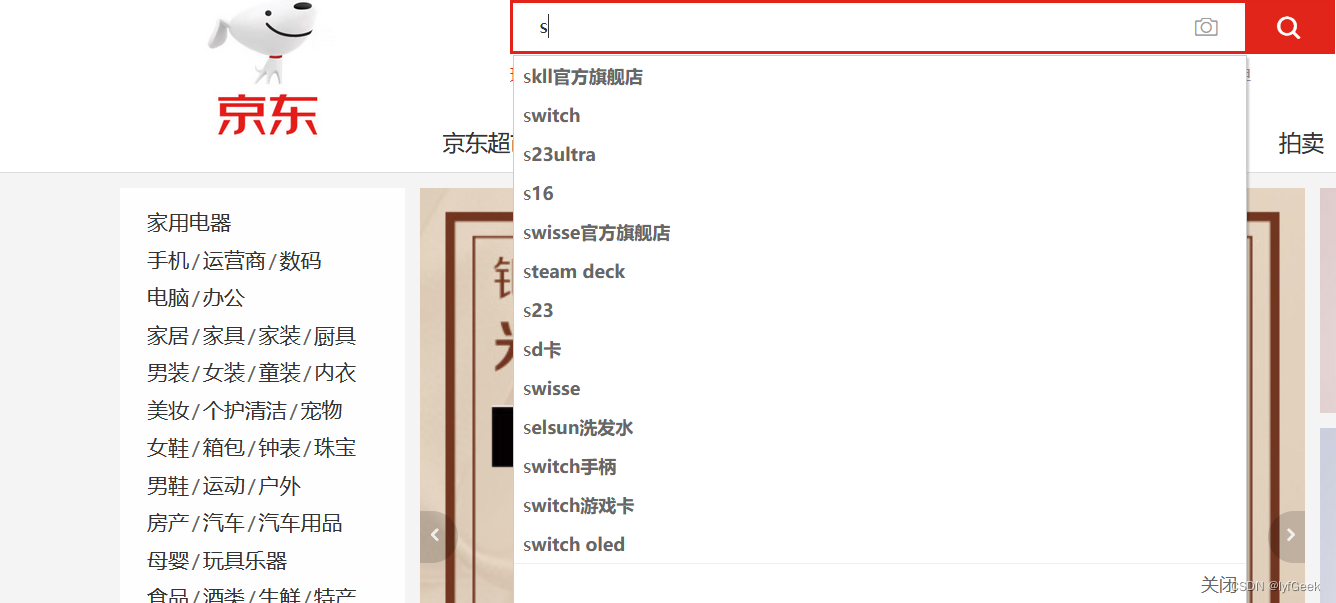
这种根据用户输入的字母,提示完整词条的功能,就是自动补全了。
因为需要根据拼音字母来推断,因此要用到拼音分词功能。
2.1. 拼音分词器。
要实现根据字母做补全,就必须对文档按照拼音分词。在 GitHub 上恰好有 elasticsearch 的拼音分词插件。地址:https://github.com/medcl/elasticsearch-analysis-pinyin。
课前资料中也提供了拼音分词器的安装包。
安装方式与 IK 分词器一样,分三步。
①解压。
②上传到虚拟机中,elasticsearch 的 plugin 目录。
③重启 elasticsearch
④测试。
详细安装步骤可以参考 IK 分词器的安装过程。
测试用法如下。
POST /_analyze
{"text": ["如家酒店还不错"],"analyzer": "ik_max_word"
}
结果。
{"tokens" : [{"token" : "ru","start_offset" : 0,"end_offset" : 0,"type" : "word","position" : 0},{"token" : "rjjdhbc","start_offset" : 0,"end_offset" : 0,"type" : "word","position" : 0},{"token" : "jia","start_offset" : 0,"end_offset" : 0,"type" : "word","position" : 1},{"token" : "jiu","start_offset" : 0,"end_offset" : 0,"type" : "word","position" : 2},{"token" : "dian","start_offset" : 0,"end_offset" : 0,"type" : "word","position" : 3},{"token" : "hai","start_offset" : 0,"end_offset" : 0,"type" : "word","position" : 4},{"token" : "bu","start_offset" : 0,"end_offset" : 0,"type" : "word","position" : 5},{"token" : "cuo","start_offset" : 0,"end_offset" : 0,"type" : "word","position" : 6}]
}2.2. 自定义分词器。
默认的拼音分词器会将每个汉字单独分为拼音,而我们希望的是每个词条形成一组拼音,需要对拼音分词器做个性化定制,形成自定义分词器。
elasticsearch 中分词器(analyzer)的组成包含三部分。
-
character filters:在 tokenizer 之前对文本进行处理。例如删除字符、替换字符。
-
tokenizer:将文本按照一定的规则切割成词条(term)。例如 keyword,就是不分词;还有 ik_smart。
term
n. 学期(尤用于英国,学校一年分三个学期);术语;期限;任期;期;词语;措辞;到期;项
vt. 把 … 称为;把 … 叫做
- tokenizer filter:将 tokenizer 输出的词条做进一步处理。例如大小写转换、同义词处理、拼音处理等。
文档分词时会依次由这三部分来处理文档。

声明自定义分词器的语法如下。
在创建索引库时通过 settings 配置自定义的 analyzer(分词器)。
PUT /test
{"settings": {"analysis": {// 自定义分词器。"analyzer": {// 分词器名称。"my_analyzer": {"tokenizer": "ik_max_word","filter": "pinyin"}}}}
}
PUT /test
{"settings": {"analysis": {// 自定义分词器。"analyzer": {// 分词器名称。"my_analyzer": {"tokenizer": "ik_max_word","filter": "py"}},// 自定义 tokenizer filter。"filter": {// 过滤器名称。"py": {// 过滤器类型,这里是 pinyin。"type": "pinyin","limit_first_letter_length": 16,"keep_full_pinyin": false,"keep_joined_full_pinyin": true,"none_chinese_pinyin_tokenize": false,"keep_original": true,"remove_duplicated_term": true}}}},"mappings": {"properties": {"name": {"type": "text","analyzer": "my_analyzer","search_analyzer": "my_analyzer"}}}
}
{"acknowledged" : true,"shards_acknowledged" : true,"index" : "test"
}测试。
POST /test/_analyze
{"text": ["如家酒店还不错"],"analyzer": "my_analyzer"
}
{"tokens" : [{"token" : "如家","start_offset" : 0,"end_offset" : 2,"type" : "CN_WORD","position" : 0},{"token" : "rujia","start_offset" : 0,"end_offset" : 2,"type" : "CN_WORD","position" : 0},{"token" : "rj","start_offset" : 0,"end_offset" : 2,"type" : "CN_WORD","position" : 0},{"token" : "酒店","start_offset" : 2,"end_offset" : 4,"type" : "CN_WORD","position" : 1},{"token" : "jiudian","start_offset" : 2,"end_offset" : 4,"type" : "CN_WORD","position" : 1},{"token" : "jd","start_offset" : 2,"end_offset" : 4,"type" : "CN_WORD","position" : 1},{"token" : "还不","start_offset" : 4,"end_offset" : 6,"type" : "CN_WORD","position" : 2},{"token" : "haibu","start_offset" : 4,"end_offset" : 6,"type" : "CN_WORD","position" : 2},{"token" : "hb","start_offset" : 4,"end_offset" : 6,"type" : "CN_WORD","position" : 2},{"token" : "不错","start_offset" : 5,"end_offset" : 7,"type" : "CN_WORD","position" : 3},{"token" : "bucuo","start_offset" : 5,"end_offset" : 7,"type" : "CN_WORD","position" : 3},{"token" : "bc","start_offset" : 5,"end_offset" : 7,"type" : "CN_WORD","position" : 3}]
}总结。
如何使用拼音分词器?
-
① 下载 pinyin 分词器。
-
② 解压并放到 elasticsearch 的 plugin 目录。
-
③ 重启即可。
如何自定义分词器?
-
① 创建索引库时,在 settings 中配置,可以包含三部分。
-
② character filter
-
③ tokenizer
-
④ filter
拼音分词器注意事项?
- 为了避免搜索到同音字,搜索时不要使用拼音分词器。
字段在创建倒排索引时应该用 my_analyzer 分词器。
字段在搜索时应该使用 ik_smart 分词器。
PUT /test
{"settings": {"analysis": {// 自定义分词器。"analyzer": {// 分词器名称。"my_analyzer": {"tokenizer": "ik_max_word","filter": "py"}},// 自定义 tokenizer filter。"filter": {// 过滤器名称。"py": {// 过滤器类型,这里是 pinyin。"type": "pinyin","limit_first_letter_length": 16,"keep_full_pinyin": false,"keep_joined_full_pinyin": true,"none_chinese_pinyin_tokenize": false,"keep_original": true,"remove_duplicated_term": true}}}},"mappings": {"properties": {"name": {"type": "text","analyzer": "my_analyzer","search_analyzer": "ik_smart"}}}
}
2.3. 自动补全查询。
elasticsearch 提供了 Completion Suggester 查询来实现自动补全功能。这个查询会匹配以用户输入内容开头的词条并返回。为了提高补全查询的效率,对于文档中字段的类型有一些约束。
-
参与补全查询的字段必须是 completion 类型。
-
字段的内容一般是用来补全的多个词条形成的数组。
比如,一个这样的索引库。
// 创建索引库。
PUT test
{"mappings": {"properties": {"title": {"type": "completion"}}}
}
然后插入下面的数据。
// 示例数据。
POST test/_doc
{"title": ["Sony","WH-1000XM5"]
}
POST test/_doc
{"title": ["SK-II","PITERA"]
}
POST test/_doc
{"title": ["Nintendo","switch"]
}
查询的 DSL 语句如下。
// 自动补全查询。
GET /test/_search
{"suggest": {"titleSuggest": {// 关键字。"text": "s","completion": {// 补全查询的字段。"field": "title",// 跳过重复的。"skip_duplicates": true,// 获取前 10 条结果。"size": 10}}}
}{"took" : 305,"timed_out" : false,"_shards" : {"total" : 1,"successful" : 1,"skipped" : 0,"failed" : 0},"hits" : {"total" : {"value" : 0,"relation" : "eq"},"max_score" : null,"hits" : [ ]},"suggest" : {"titleSuggest" : [{"text" : "s","offset" : 0,"length" : 1,"options" : [{"text" : "SK-II","_index" : "test","_type" : "_doc","_id" : "xceQcIcBAo7LWD6k-sCY","_score" : 1.0,"_source" : {"title" : ["SK-II","PITERA"]}},{"text" : "Sony","_index" : "test","_type" : "_doc","_id" : "xMeQcIcBAo7LWD6k9MBJ","_score" : 1.0,"_source" : {"title" : ["Sony","WH-1000XM5"]}},{"text" : "switch","_index" : "test","_type" : "_doc","_id" : "xseQcIcBAo7LWD6k_8DL","_score" : 1.0,"_source" : {"title" : ["Nintendo","switch"]}}]}]}
}2.4. 实现酒店搜索框自动补全。
现在,我们的 hotel 索引库还没有设置拼音分词器,需要修改索引库中的配置。但是我们知道索引库是无法修改的,只能删除然后重新创建。
另外,我们需要添加一个字段,用来做自动补全,将 brand、suggestion、city 等都放进去,作为自动补全的提示。
因此,总结一下,我们需要做的事情包括。
-
修改 hotel 索引库结构,设置自定义拼音分词器。
-
修改索引库的 name、all 字段,使用自定义分词器。
-
索引库添加一个新字段 suggestion,类型为 completion 类型,使用自定义的分词器。
-
给 HotelDoc 类添加 suggestion 字段,内容包含 brand、business。
-
重新导入数据到 hotel 库。
2.4.1. 修改酒店映射结构。
代码如下。
DELETE /hotel// 酒店数据索引库。
PUT /hotel
{"settings": {"analysis": {"analyzer": {"text_analyzer": {"tokenizer": "ik_max_word","filter": "py"},"completion_analyzer": {"tokenizer": "keyword","filter": "py"}},"filter": {"py": {"limit_first_letter_length": 16,"type": "pinyin","keep_full_pinyin": false,"keep_joined_full_pinyin": true,"none_chinese_pinyin_tokenize": false,"keep_original": true,"remove_duplicated_term": true}}}},"mappings": {"properties": {"all": {"type": "text","analyzer": "text_analyzer","search_analyzer": "ik_smart"},"id": {"type": "keyword"},"address": {"type": "keyword","index": false},"brand": {"type": "keyword","copy_to": "all"},"business": {"type": "keyword","copy_to": "all"},"city": {"type": "keyword"},"location": {"type": "geo_point"},"name": {"type": "text","analyzer": "text_analyzer","search_analyzer": "ik_smart","copy_to": "all"},"pic": {"type": "keyword","index": false},"price": {"type": "integer"},"score": {"type": "integer"},"starName": {"type": "keyword"},"suggestion": {"type": "completion","analyzer": "completion_analyzer"}}}
}2.4.2. 修改 HotelDoc 实体。
HotelDoc 中要添加一个字段,用来做自动补全,内容可以是酒店品牌、城市、商圈等信息。按照自动补全字段的要求,最好是这些字段的数组。
因此我们在 HotelDoc 中添加一个 suggestion 字段,类型为 List<String>,然后将 brand、city、business 等信息放到里面。
代码如下。
package com.geek.elasticsearchgeek.hotel.pojo;import lombok.AllArgsConstructor;
import lombok.Data;
import lombok.NoArgsConstructor;import java.io.Serializable;
import java.util.ArrayList;
import java.util.Arrays;
import java.util.Collections;
import java.util.List;/* @author geek*/
@Data
@AllArgsConstructor
@NoArgsConstructor
public class HotelDoc implements Serializable {private Long id;private String name;private String address;private Integer price;private Integer score;private String brand;private String city;private String starName;private String business;private String location;private String pic;/* 排序时的距离值。*/private Object distance;private Boolean bAdvertise;private List<String> suggestion;public HotelDoc(Hotel hotel) {this.id = hotel.getId();this.name = hotel.getName();this.address = hotel.getAddress();this.price = hotel.getPrice();this.score = hotel.getScore();this.brand = hotel.getBrand();this.city = hotel.getCity();this.starName = hotel.getStarName();this.business = hotel.getBusiness();this.location = hotel.getLatitude() + ", " + hotel.getLongitude();this.pic = hotel.getPic();// 组装 suggestion。if (this.business.contains("/")) {// business 有多个值,需要切割。String[] split = this.business.split("/");// 添加元素。this.suggestion = new ArrayList<>();this.suggestion.add(this.brand);Collections.addAll(this.suggestion, split);} else {this.suggestion = Arrays.asList(this.brand, this.business);}}}2.4.3. 重新导入。
重新执行之前编写的导入数据功能,可以看到新的酒店数据中包含了 suggestion。
测试。
GET /hotel/_search
{"suggest": {"suggestions": {"text": "h","completion": {"field": "suggestion","skip_duplicates": true,"size": 10}}}
}
2.4.4. 自动补全查询的 JavaAPI。
之前我们学习了自动补全查询的 DSL,而没有学习对应的 JavaAPI,这里给出一个示例。
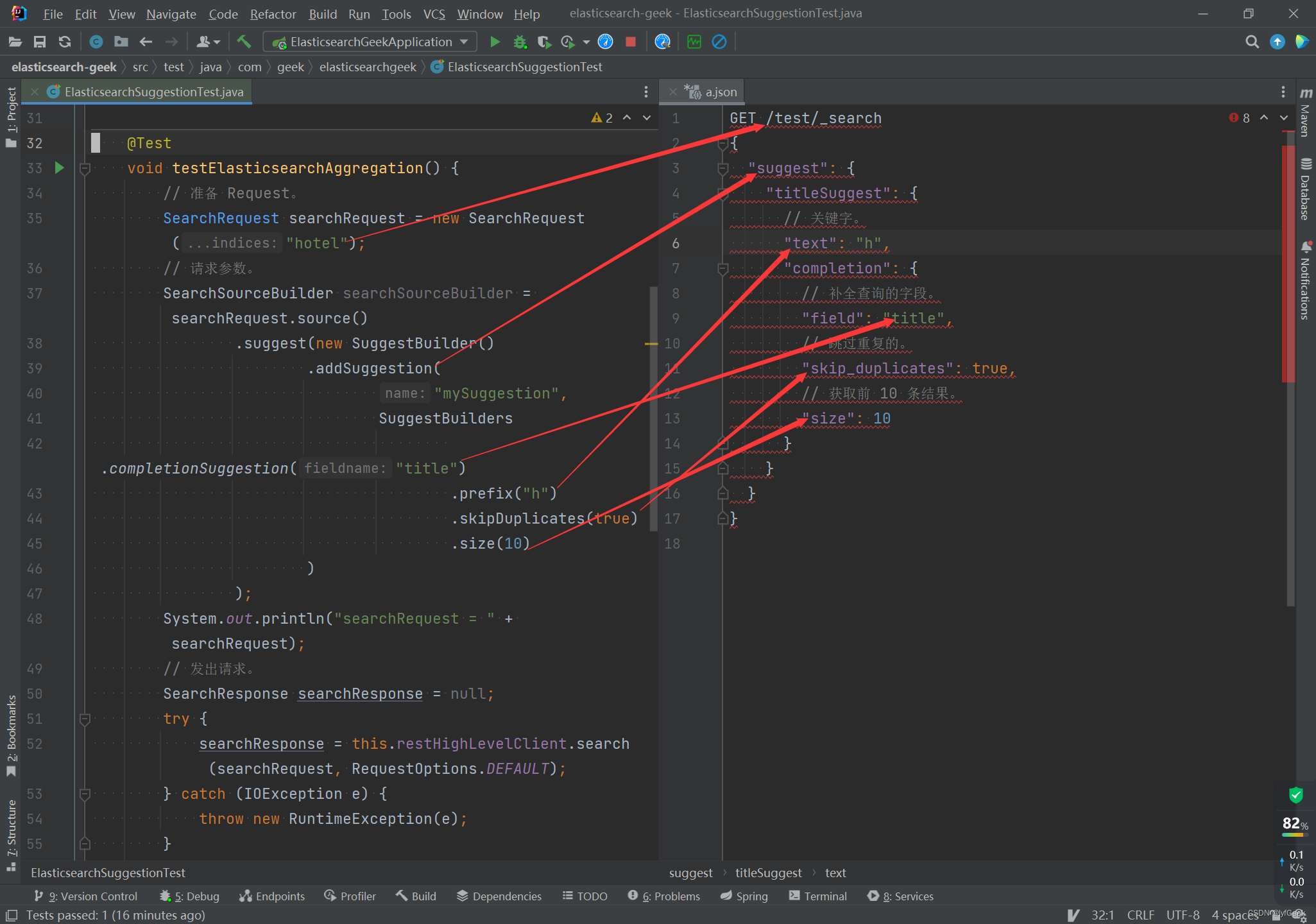
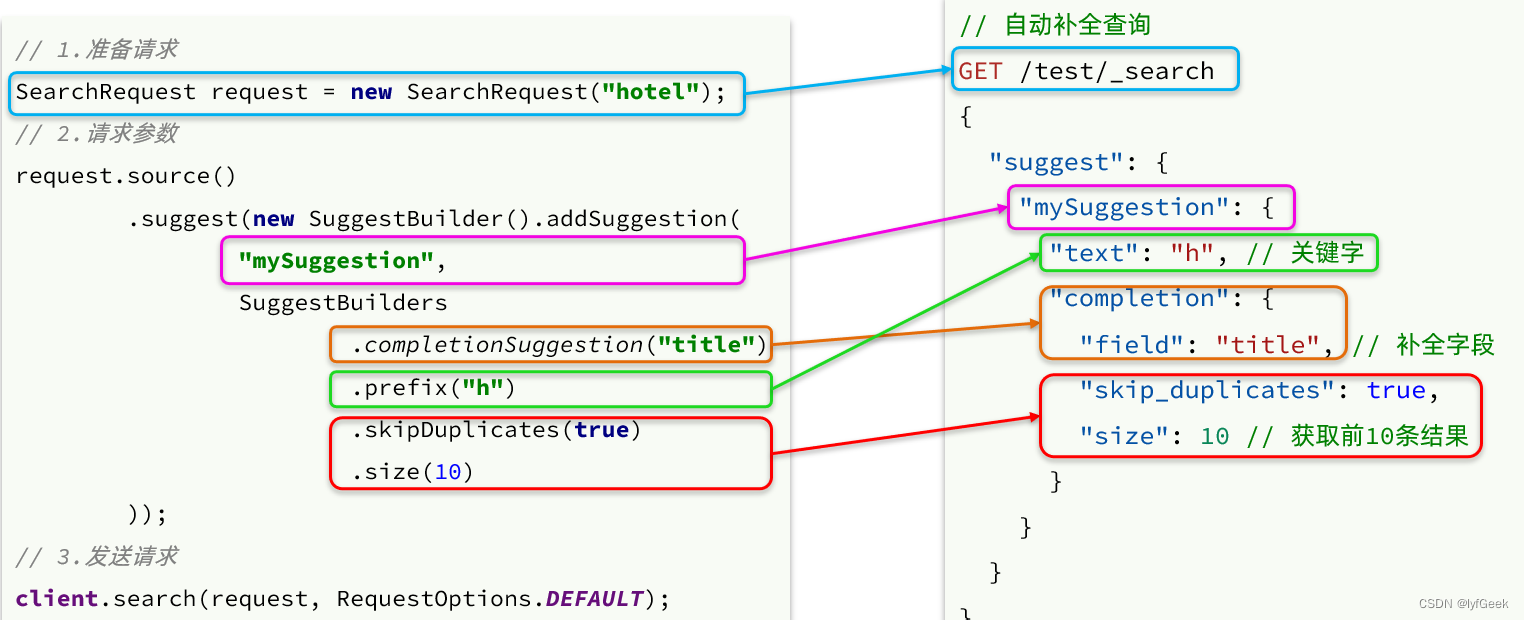
而自动补全的结果也比较特殊,解析的代码如下。
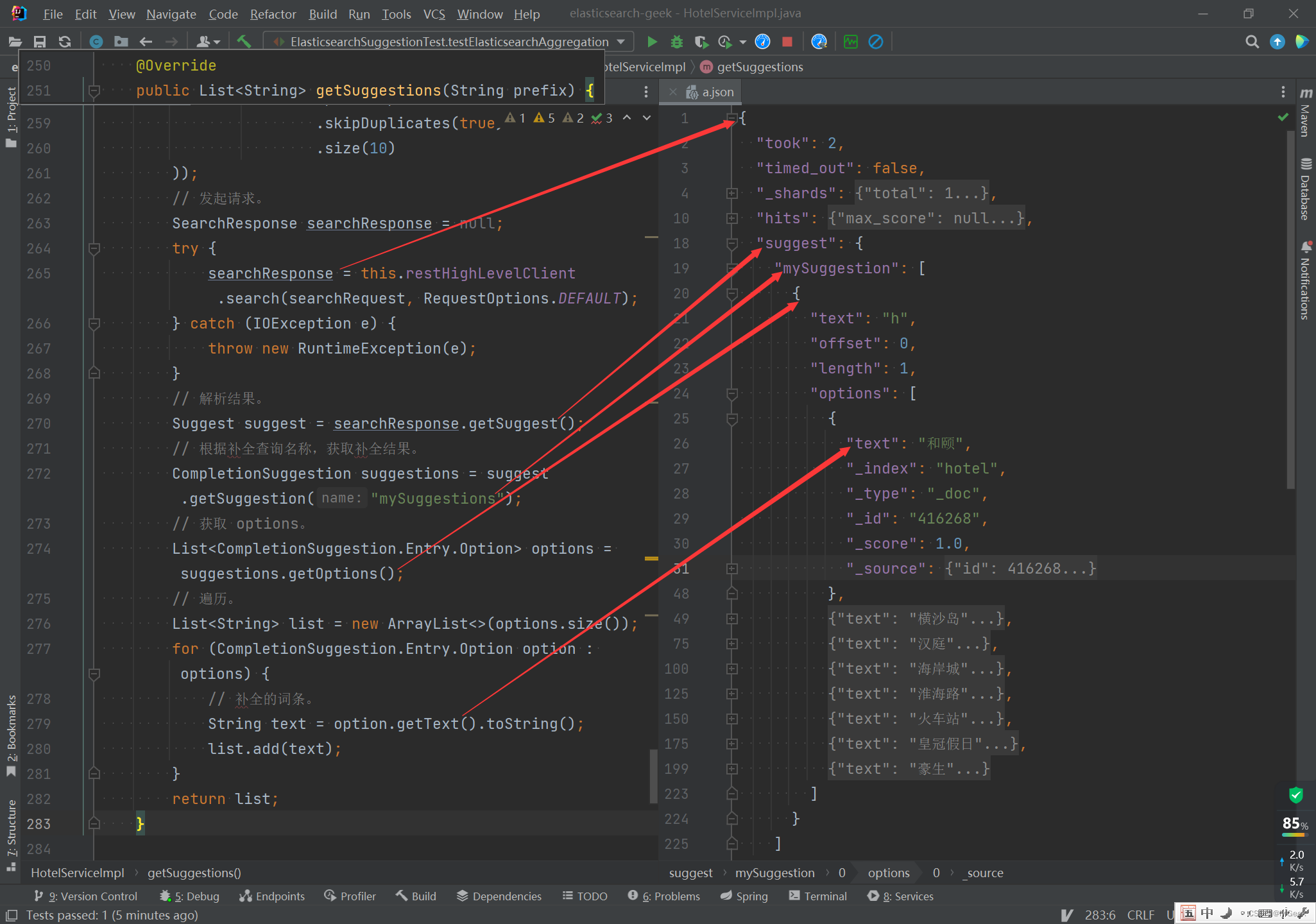
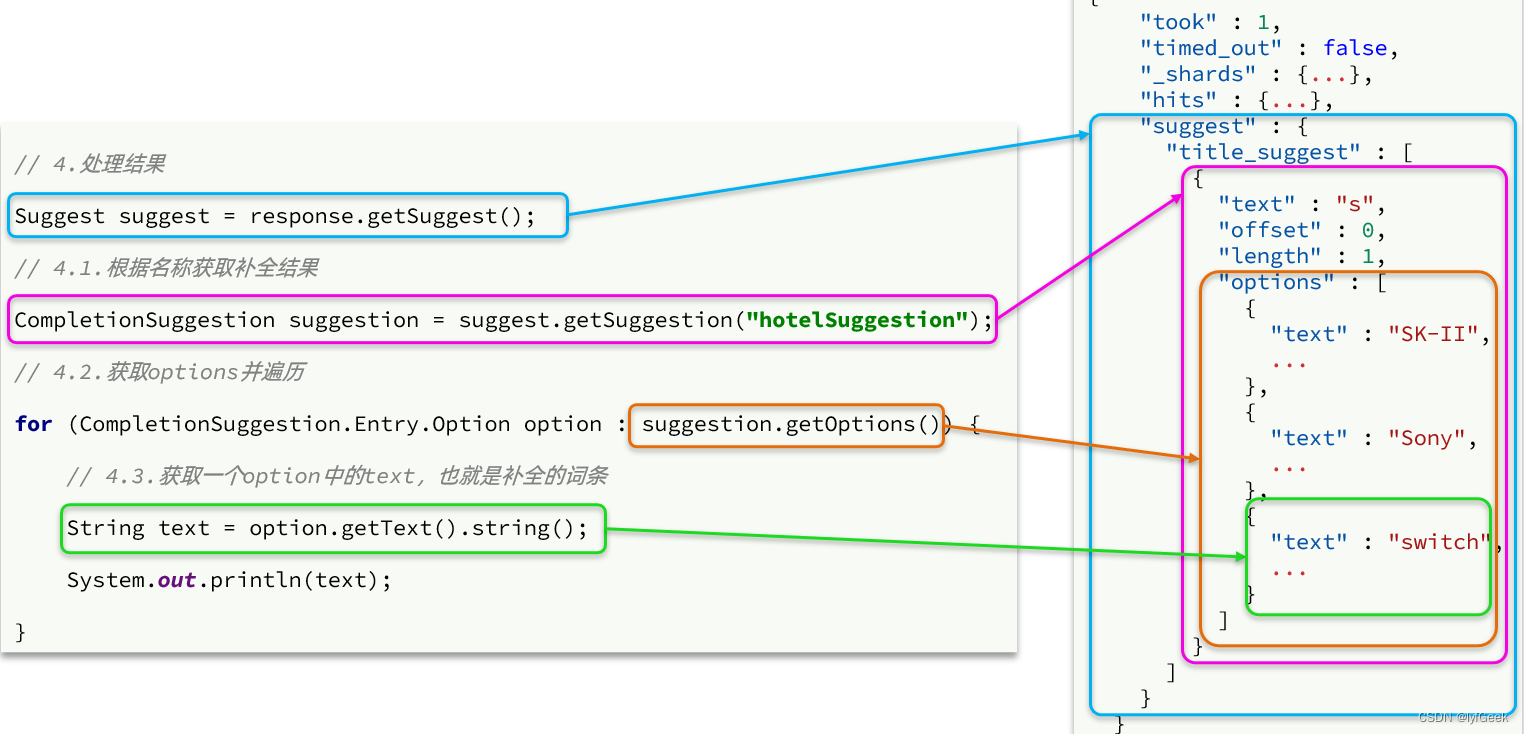
2.4.5. 实现搜索框自动补全。
查看前端页面,可以发现当我们在输入框键入时,前端会发起 ajax 请求。
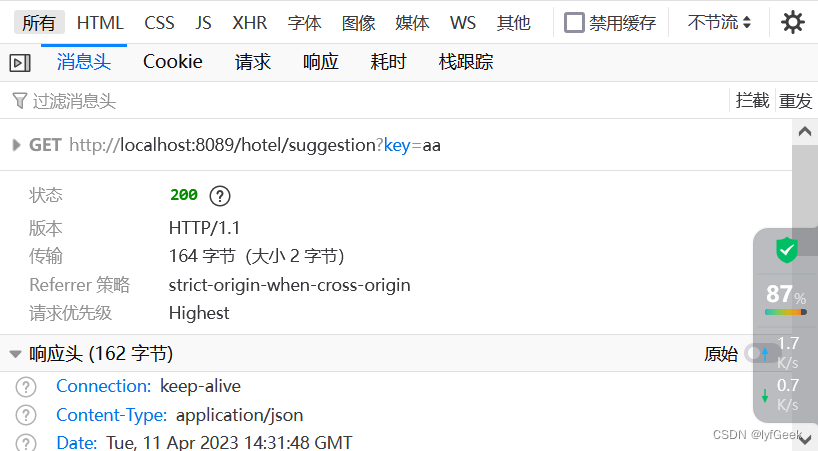
返回值是补全词条的集合,类型为 List<String>。
1)在 com.geek.elasticsearchgeek.hotel.controller 包下的 HotelController 中添加新接口,接收新的请求。
@RequestMapping("/suggestion")public List<String> getSuggestions(@RequestParam("key") String prefix) {return this.hotelService.getSuggestions(prefix);}2)在 com.geek.elasticsearchgeek.hotel.service 包下的 IhotelService 中添加方法。
List<String> getSuggestions(String prefix);
3)在 com.geek.elasticsearchgeek.hotel.service.impl.HotelService 中实现该方法。
@Overridepublic List<String> getSuggestions(String prefix) {// 准备 Request。SearchRequest searchRequest = new SearchRequest("hotel");// 准备 DSL。searchRequest.source().suggest(new SuggestBuilder().addSuggestion("suggestions",SuggestBuilders.completionSuggestion("suggestion").prefix(prefix).skipDuplicates(true).size(10)));// 发起请求。SearchResponse searchResponse = null;try {searchResponse = this.restHighLevelClient.search(searchRequest, RequestOptions.DEFAULT);} catch (IOException e) {throw new RuntimeException(e);}// 解析结果。Suggest suggest = searchResponse.getSuggest();// 根据补全查询名称,获取补全结果。CompletionSuggestion suggestions = suggest.getSuggestion("mySuggestions");// 获取 options。List<CompletionSuggestion.Entry.Option> options = suggestions.getOptions();// 遍历。List<String> list = new ArrayList<>(options.size());for (CompletionSuggestion.Entry.Option option : options) {// 补全的词条。String text = option.getText().toString();list.add(text);}return list;}